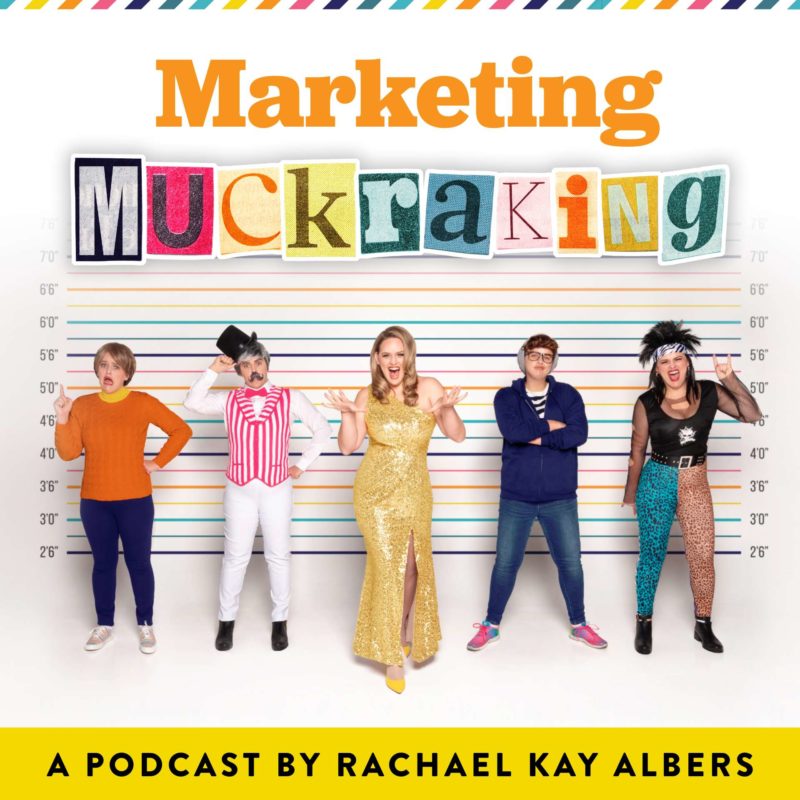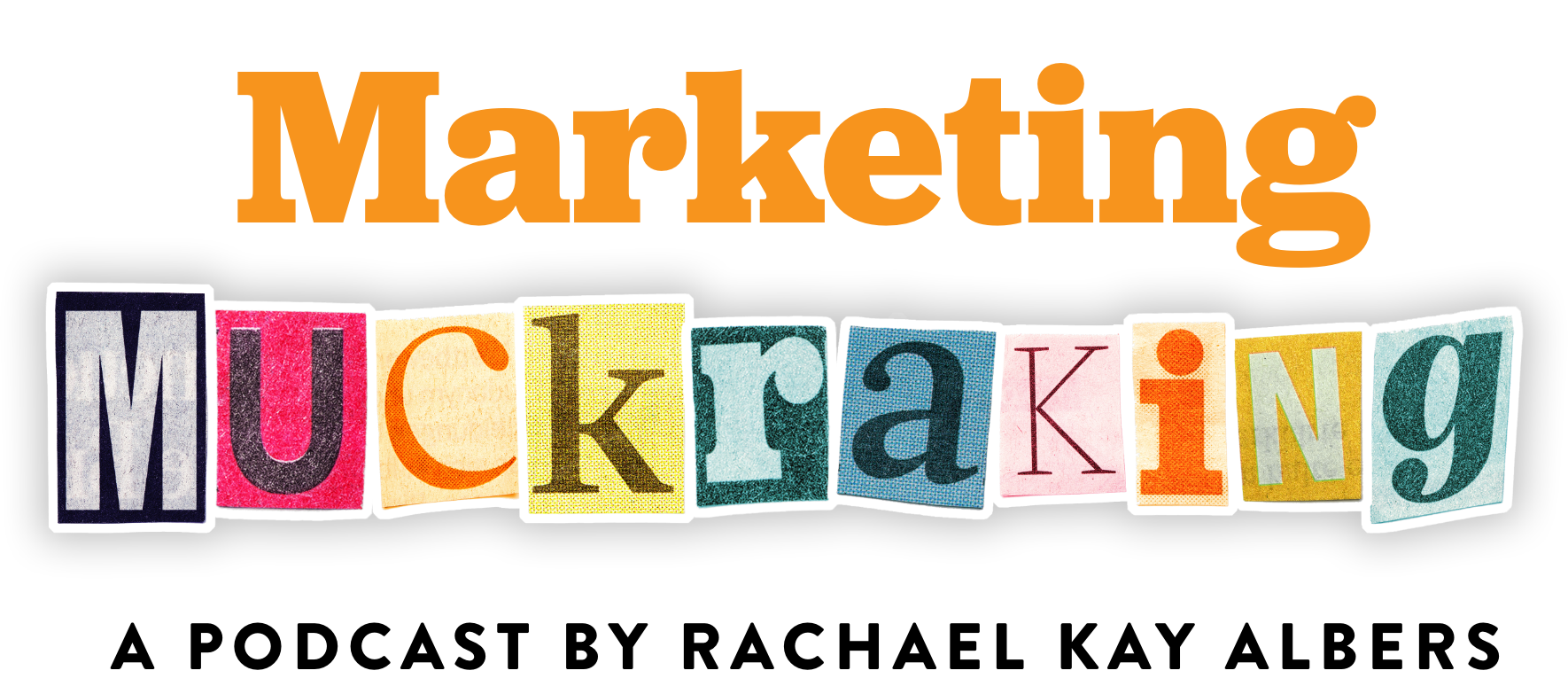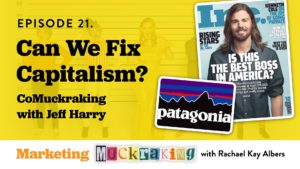Welcome to Part 4, the final installment of the Online Business Family Tree series, where we traced back how we arrived at this moment in internet marketing and online business and who are the key leaders who brought us here.
We also highlighted the 10 elements of the rotten tree. To review:
- Prosperity gospel and the "pull yourself up by your bootstraps" myth of meritocracy
- Mastermind relationships and being "in the room" where it happens with powerful leaders
- JV partnerships
- Affiliate marketing
- Tabloid / clickbait / pain point / shame-based marketing
- Gaming the system
- Propaganda, mind control, and hypnosis
- Cross-pollinating audiences
- Personal branding and “If I did it, you can, too”
- And finally, the idea that you don’t have to cite your sources, fuck your sources. So that the web becomes so tangled, no one knows where any of this came from.
But now, hopefully, you do know.
And our hope is that this series has helped you become a more informed consumer, a more ethical marketer, and that you feel seen and less alone in this jungle of the Online Business Industrial Complex.
To understand marketing history is to understand ourselves and our culture — marketing is the fuel for the engine of capitalism.
But now that we’ve taken this trip through time, it’s time to talk about what to do next and how do we build a better future…
About Lisa Robbin Young
Lisa Robbin Young has 30 years of business experience as a coach and creative entrepreneur: she is an award-winning speaker, best-selling author, and accomplished musician with multiple albums to her credit. You may even recognize her from the Disney+ show “Encore.” She is also the host of the “Creative Freedom” show — I highly recommend her music video parodies. Check out “There are worse things I could do” for a Marie Forleo crossover with Awkward Marketing. She specializes in helping creative entrepreneurs build a business that works for how you’re wired to work.
An annotated guide to the online business family members we discuss in Part 4:

You, me, us
You are a part of this family tree, too. And we need you. It's time for us to build a better world, to plant seeds in a garden that will grow and flourish for years to come, and to help each other move towards the future. We can't do it without you.
Episode Transcript
Rachael Kay Albers: So, you and I come in on opposite sides on this, because I don't believe that capitalism, as an economic system can be reformed. Because in my experience, knowledge, research, and in the almost 500 years that capitalism has been evolving to this point, more good people with more money has never worked out in terms of solving the world's problems.
And in order for good people to make more money, it always means exploiting somebody at the bottom, which is why I just don't believe that it can be reformed. You have a little bit more hope for the capitalist system, right?
Lisa Robbin Young: I mean, yeah, for me – the reason that I am an entrepreneur, the reason that I coach and work with businesses and really try to help them build something that works for how they're wired to work is because I believe in this, this notion of enoughness. And that if you want to change a system, you have to change it from the inside. People on the outside cannot change that system.
All you have to do is look at the Supreme Court and know that those are the ones that are changing the system. They're inside it, they're the ones making the rules. They're the ones making the decisions. Now, can people outside that system have influence? Yes. Again, look at the Supreme Court and we can see all the influential people who have made their mark on those Supreme Court justices.
So, people outside the system can influence, but you have to be in the system to make change. And so I like working with entrepreneurs so that they can look at new ways of being entrepreneurial, new ways of having a living wage, new ways of doing things that work for how they're wired to work – with the understanding that the system is still broken.
And it's going to take a lot more people making those kinds of changes at that granular grassroots level before the whole system is changed. And it may mean that, at some point, that system goes away completely. But if this is the system that we have, that doesn't mean we should just blithely go our merry way and succumb. Let's shake shit up. Let's be a muckraker. Let's change what we can change so that we can start moving forward toward this place where everybody does have enough.
Everybody doesn't need to be a billionaire. Everybody doesn't need to be a millionaire. But I think if everybody was able to make a comfortable six figure salary in their community, they could do what they needed to do, they can enjoy their life, and it wouldn't have to feel so hard. And I believe that is attainable for a good majority of people. I believe that is possible. That is still where my brain is at. I'm willing to be wrong. But right now that's the hope that I hold.
Rachael: Yeah, my question is with the infrastructure in the global economy we have – is that possible in the United States of America? Maybe? But what does that mean for the rest of the world? What does that mean for folks in struggling economies? Like we talk about the Tim Ferriss bros of the world who wrote The Four Hour Work Week and taught about how to work less and play more.
And he's off diving with sharks and riding bulls and all of it is based on him drop shipping and outsourcing the majority of his work to folks in economies that can afford to charge $5, $6, $7 an hour. Or less!
Lisa: And we are seeing third world countries becoming second world countries, second world countries becoming almost first world countries – from a living wage perspective. And I'm no economist. So I cannot go down this rabbit hole very far. But what I can say is that in the circles that I've traveled in, I have seen where even in the Philippines, they are demanding higher wages and they are now getting them. It’s happening for them.
They're starting to be paid commensurate to what people in the United States would get paid. And again, we're in this system so there's constraints around that. But we are starting to see some of that happening. And I'm not a fan of trickle down economics. I’m not. But I can see those wheels starting to turn. And until we have a different system, let's keep perpetuating that forward motion for all the people all over the world.
Will it be harder in Bangladesh? Probably. Right? Because we come to the table with different advantages, right? And they can still advocate, right? And people here who can be the voice for those voiceless can advocate, right? And that's part of what we're doing in conversations like this is we're shining the light and saying, “Look, the stuff that's going on here is impacting people on a global scale and you need to be aware of that,” right?
“That t-shirt that you bought for $3 at Walmart was made in a sweatshop somewhere,” right? “And it was bought by Walmart for like 42 cents,” right? So that means they made even less and we have to recognize that and take ownership of our part in that if we want to know better and do better.
Rachael: I appreciate you bringing this perspective because I talk a lot about my theories of different changemakers and we've got folks who are doing reform working within existing systems to make them better today. Because we're not going to overthrow capitalism tomorrow – in any utopia, right? And we've got the fire starters who are burning shit down and showing us what is broken.
And that allows the visionaries to think outside the system we have today to propose radical solutions beyond our current reality. And then we have the bridge builders. I think you might be a bridge builder, Lisa – who are a combination of all of these things – seeing the ways that we need to make change in the current system. But also understanding that we've got to burn shit down, taking us by the hand and leading us towards this brave new world.
We need all of these perspectives and strengths and approaches and by no means is my evolving concept on changemaking the definitive one. But I think a lot of folks resonate and identify with a reform mindset and not everyone has a fire starter within them to burn everything down. That happens to be my way of experiencing the world.
It's not the only way of experiencing the world. And I have to remind myself sometimes… Sometimes I look around and I'm like, “Why are you burning shit down? Why aren't you angrier?” And then I realize that's not how that person experiences it. That's not their lived experience, that's not their skill set, that's not their strength. And the other side of that is they can often look at me – people who are not fire starters often say, “Why are you burning shit down? Why can't you just get along? Why can't you just be a reformer like me? Where's the shiny new visionary solution, Rachael?” And I, you know, I've come to a place where it's like, no – we need all of us.
We need the reformers, we need the visionaries, we need the bridge builders and we also need the fire starters. And I'm gonna do this because this is what I do. Not everyone has the privilege of burning shit down all the time, right?
Lisa: And that's key, right? To be able to step into these different kinds of identities comes with a level of privilege. I would agree with you that I’m a bridge builder because I stand with my feet in both worlds. Too white to be black, too black to be white. Too old to be a millennial, but too young to really resonate with a lot of the Gen Xers, right?
So I’m in this weird middle space and I can see. “Oh yeah. Yeah. Well, that's why y'all are like that, Boomers. OK. That's why y'all are like that, millennials, and here's the language that you can both speak so that you guys can start to see what's going on.”
I never considered myself an activist until I started having more conversations with you because I recognized that people have to be activists in their own way.
And for me, I was raised with, “Put your head down, get your work done, work as hard as you can. They're gonna come for you if you don't do your work.” And so I sat back and watched things and I was like, “Well, this is how I'm gonna make change. I'm gonna help these people who can then go out and be the celebrity in their space and go be the changemaker and draw the crowd and create the movement and they can have that kind of an impact.”
But then in my conversations with you, it's like – well, I've got all of this knowledge stored up inside me from all of these years of working behind the scenes in these organizations that just naturally through osmosis trickled down to my people and they don't know the back story. They don't know what's been going on. That's led us to this, this moment in time.
And OK, let's have that conversation, let's do it publicly. Let's get it on the record so that people know, “Oh my gosh, these roots run deep and many of them are rotten and we have to start picking this stuff up.” I'm not the one to pick it out. I'm the one to come tell the story. Connect the dots, point to things. You're the one that's like, “This shit's got to go.”
And then there's somebody else who's like, “Here's the new way that is going to work.” And then we as watchdogs can go, “Yes, that is a better choice” or “Part of that's good. And some of it's problematic and here's what you need to know, right?” Like for me, it's all about nuance. It's all about context. It's all about backstory because the history matters – because that's what led us to this moment.
One of the things I tell my clients all the time is success is a destination. I'm gonna be a little philosophical here. You are already there. Look around you. If you don't like the success that you see right now, you gotta make different choices, right? You've gotta choose differently, act differently, be differently, associate with different people because everything that you've done or not done has led you to this moment and marketing is just one microcosm of what has been happening in the world, right?
Like – they made choices, they went glamping with muskrats, you know? They did this thing and they brought this thing online and they decided that they were going to capitalize on this and all those choices led us to this conversation with you and me and, you know, all of our closest friends to talk about this journey that we've gotten to. And if this is what success is like today and it sucks, what are we going to do differently?
Rachael: We've gotten to the hope portion of the show, folks and we really needed it, didn't we? It's been a long time coming. And what I love that you've done is you have called us back to the muskrats and the millions and the glamping. But you've also called us back to one of the original myths that we started off with, which was the “pull yourself up by your bootstraps” myth. The individualist, meritocracy myth – all linked to the prosperity gospel and the origins of this country and this economic system – which tells us that the change we seek will come from one visionary entrepreneur. Will come from an individual amassing wealth and capital, having a good idea, taking that to market. And that is the innovation that it needs.
And what we've been circling around here is, “No, the answers are in WE, not ME.” So this is why the one thing that people requested from this show, I didn't give them, which was people have a desire for us to now give a list of all the coaches they should follow. “Ok. So this is the wrong way. Tell me the right way. The three steps, the elixir, the magic cure for all of the ails of this system.” If only! I mean, believe me – I wish. And if I did, if we did, we'd have our own island, wouldn't we? I'm kidding. We wouldn't have an island. We wouldn't do that. But I don’t know if I’m above that – that’s the thing.
Lisa: I'd have an island. I just wouldn't charge people six figures to come visit because I like company. So come.
Rachael: You know, I don't want to say I'm above that. When I started doing my own whistle blowing, I made a joke that was like – my gift was that all of these people ignored me all these years. Because if any of these folks that we've named today had given me the time of the day, I probably would have named my firstborn after them. That’s how grateful I would have been. I don't know if I trust myself with immense wealth and that degree of influence and power because power corrupts. And because yeah – then you're in this echo chamber. We talk about the echo chamber of online marketing, but there's an echo chamber happening in these masterminds where they're all reinforcing each other's bullshit. But really what this comes down to is – it's not in a guru. It's not that you need to swap out Marie Forleo for a better Marie Forleo. It’s not that we need to swap out Tony Robbins for another flavor of Tony Robbins because there will always be another flavor of Tony Robbins.
Lisa: It's the multi-headed hydra – you cut one off and a new one shows up.
Rachael: So the answers we seek don't come from you knowing some secret hidden pathway to making millions or becoming a celebrity. That’s not the answer we seek.
The answer is going to come in the collective – in all of us coming together. And it's funny because we were talking about the value of these programs. It’s often in the communities that get built out of them. So the people who have made money because of B-School have made money because they made relationships with each other. It goes back to the masterminds. So there's a good and a bad to that.
The celebrity masterminds that started it all…where did the magic happen? It happened in the collective and where is the change we seek in this world? It's gonna happen in the collective. So we've come to the hope portion of the show.
What do people do with this information, Lisa, other than cry themselves to sleep?
Lisa: Well, I mean, it comes back to what we talked about at the top of the show. When you know better, you can choose to do better. And it is a choice, right? Because for as much calling out as we've done today, all of those people have had a choice at any step along the way to choose differently, to do differently, or to stay the course. Some people have evolved for better or for worse, right?
And some people have kind of stayed the same, the same, the same, the same. And so it's incumbent upon us as business owners, as marketers, as human beings on planet earth to do the work of knowing, right? The due diligence, the checking your sources, right? The checking the work, right? The googling it and then hitting Snopes and then talking to some people and, and getting some more feedback, right?
Like, don't just go into things. We're in a time where you can fact check. So do it. Do the work. Yes, it takes more spoons. Yes, some of us are more privileged than others when it comes to that. So find those people that you trust who aren't the big name gurus, who are part of your community, who are the inner circle that you can rely on. You know, I talk to Rachel because I trust that she's not gonna screw me.
She doesn't have anything to sell to me when we're talking, right? I don't have anything to sell to her when we're talking. It's like, let's be clear about what we're doing and what do you think about this and where do you think that's going? And let's have these conversations? We've got to do that work so that we can walk into any sales situation, any relationship, any job offer, any business arrangement with our eyes open to, “Oh, I know where that tactic comes from. How am I going to respond instead of how will I react?” That's the work. That's what we need to do.
Rachael: Yes. And this goes back to all of the mind control and the clickbait and the trust by association – it’s built on overriding our agency and speaking to our urgency and this is why any time urgency is a part of the sales method, especially manufactured urgency, you gotta check yourself. If you feel like you're in a hurry to figure out, “Should I buy this thing? Should I make this investment? And I only have 12 hours to go before they close the cart?” The answer is no, don't buy the thing, right? And they're banking on the fact that you don't have the time and you don't have the energy and you don't have the spoons and you don't feel that you have the capacity to do the research or to talk about it with your spouse.
One of my least favorite things is when people teach sales methods of how to overcome the objection of wanting to talk to my partner or spouse before I make this investment and using that kind of like, “If you have to ask for permission, there's something wrong with your marriage or your partnership.” To me, that is a very valid objection to be making in a sales cycle. If I was still partnered and my partner went and made a massive financial decision without us having a conversation about it, then I’d be getting a divorce again, right?
It's all about overriding agency which goes back to Edward Bernays and propaganda – he taught how to override people's agency using things like urgency and all this kind of stuff. But this goes back to the mass production economy of needing to train us to be buyers and to just buy, buy, buy instead of slowing down.
And part of how this becomes so entrenched is you work the working class to the bone where now they don't have any time, energy, capacity to do the research or to make goods themselves or to barter and trade or to go out of their way to buy from a small local business versus buying from the Walmart down the street or whatever it might be, right? All of us are so entrenched, we don't have the spoons, as you said, we don't have the time, the energy, the capacity to do the research.
And that's how the system continues to perpetuate itself, which is why we're doing this podcast because not everybody can research all of these names and all of these things and figure out who they trust and who they don't trust. So we're creating a little bit of a shortcut for them.
Lisa: Right. But there's still plenty of work to do. Like, let's be clear, we scratched the surface – the tip of the iceberg in this conversation. And I know this conversation has not been a short one. But look, I've been online for like 30 years. So to be able to condense all this down into just an episode or two or three, there's still so much more that's been left unsaid on the cutting room floor.
So there's more work to do. Like the work doesn't end with listening to a podcast. You know, the work doesn't end with, “I fact check one thing.” And so it's do what you can as you are able. And, you know, this is where I will invoke probably the smartest thing Richard Branson ever said. “Opportunities are like buses. There's always another one coming.”
If you're feeling that pull of FOMO, if that program is good, they're gonna offer it again. That's why we have B-School season. It comes back because it sells for them and if it sells for them they're gonna keep selling it because they know the marketing works. It's terribly effective.
Rachael: So, in our hope part of the show – one, you said before we recorded this, “It's not a call to action, it's a call to arms.” And number one is to arm ourselves with truth, right? To just slow down – that's really the message here, is to slow down. Do your research, have the conversations instead of making buying decisions out of urgency and scarcity and like this is the last time this is ever gonna be offered.
The only reason anyone would ever offer something for the last time is if it didn't sell and if it doesn't sell – that in and of itself is a good reason not to buy it. But number one, arm yourself with truth, number two, as you just led here us to – there's more work to do. And so my agenda is always to remind us to put it on the record. If you do have the privilege and the ability to identify some of these things out in the wild, part of the reason that these things keep perpetuating, just like the Napoleon Hill days was – people couldn't go on Google back when Napoleon Hill was going town to town and scamming people. They couldn't fact check so they couldn't protect themselves. Similarly today, because of all these NDAs and these cult of personalities where nobody wants to betray the teacher because then they'll get ousted from the cool kids club. And also because they've saturated the Google landscape with so much of the circle jerk bullshit..it's really hard to find some of this information.
When you see something, say something and put it on the damn Google record. That is a service that you're doing to other consumers. You're helping other people not get got.. And that is a form of activism and that is a form of muckraking. So if you have the ability to find the muckraker inside of you and sometimes that just means writing a review, sometimes it might mean sharing it with your friends.
Lisa: And if you have a platform and you have an audience – use that platform to help people make informed consumer choices. The more influence you have, the more important it is for you to use that voice for the people, you know, because of the people who can't, right?
It's incumbent upon you and it is your responsibility because of the privilege that you have to speak up and speak out for the people who can't because otherwise we continue to perpetuate a system that's built on this illusion of being in the right room at the right time and a certain number of ships get risen. But the rest of us are sitting in dry dock wondering what the hell is going on.
Rachael: Yeah. And you see a lot of folks who have retired from coaching or have realized they've woken up to these harms and they realize that they got themselves into something that they don't want to be a part of and it goes against their ethics. But often what they do is they take their wealth that they've built through these shady tactics and they slink away off into the sunset and are like, “Good luck, everybody. I'm retiring now because I think this is unethical and I have the privilege to do that because I built my wealth using unethical means.” And I do believe that there is a responsibility to – if someone has committed harm and harmed you and you've built your wealth also by perpetuating that harm and you want to get out of the business. Well, before you go, can you do some good? And it's not, it's not doing good.
That does not mean having a fire sale for all of your products at 70% off before you close your doors and go off and sit on your nest egg while everyone else is still out here trying to just get by. So you've got to – one, arm yourself with truth and two, put it on the record. And three, what's our final message of hope today, Lisa?
Lisa: Don't go it alone. I think that's the big one. Our power is in our community, right? And you said this earlier – it's exhausting to try and do this yourself. I don't know how you do as much as you do. You're a one woman show in a lot of respects, a lot of the time and that carries a burden that takes a toll and when we can lean on one another, when we can invest in each other – community, right?
And glean that knowledge and share that support and be that support for somebody else. Don't think you have to do this alone and don't try to do this by yourself. Really arm yourself with good people and have those people around you. You know, I don't quote a lot of Will Smith, but one of the things that he talks about is like, “If you can't handle me on my worst day, you don't get me on my best day,” right?
I think this was Oprah who said, “If you can't ride with me on the bus, you're not riding with me in the limo,” right? Like those are the people – our community – that we need to be putting our faith and our trust in – not these people who've been elevated to the level of multinational corporations.
Rachael: Well, and it's fitting that we're doing this episode because when I did my FREE SCHOOL, burn it all down, and I was sitting in the ashes of my life and the way that I had harmed my own reputation and the friends that I lost and the business that I lost and I'm going through a divorce and I'm all alone – who was there with me? Lisa. And we had hours and hours of conversations like you said, where we're not selling each other anything. We're talking about life and we're talking about business and we're talking about relationships and pain and healing and growth and I wouldn't have been able to come out of that and fully embrace the muckraker in me if it wasn't for those conversations that nobody was paying to have. We weren't paying each other to be there. And I'm so grateful for you and how you were there during that time. Thank you, Lisa.
Lisa: Don't make me cry, man. Don't make me cry. But I mean, this is the thing, right? This is how the rising tide really works, right? We go out glamping in the woods with the muskrats because we want to be with each other. Not because there's necessarily a monetized motive to make that happen. Does that happen sometimes? Sure. I'm on your show and I'm so honored and thrilled to be here, but that didn't happen because I was angling for a spot on your show. It happened because we built a relationship and talked about the realities of how wretched this family tree really is and how rotten it is to the core. And we've had enough of those conversations that you were like, “OK, we need to tell some people.”
That takes time and people want to shortcut that and that's what those people are selling. “We've got a shortcut.” No, they don't have a shortcut. They have a short way to shortcut you from your cash to their wallet, right? But it's still gonna take work. There's still effort involved on the other side and look, I teach this, I teach marketing, I teach business coaching stuff. I look at business models. I do this stuff for a living and I have for 20 years and I don't even want my clients to just take me at face value. Do the research, do the work, look it up. I'm not selling you schlock, I've done my homework and I want you to do the homework too. I want you to be armed with the knowledge so that when you leave my presence and my work, you can still have a successful business and I am not your crutch.
But more than that you're a better human being. Because that's what this really is about for me. I want better business owners. Yes. But I want better human beings on the back end because it's those human beings that engage with other human beings, that raise children that have families that live lives beyond the thing that they're trying to sell. I want better humans and if I can have some small hand in making that possible, I'm here for it.
Rachael: And with that, this has been Marketing Muckraking. Thank you for being with us here today. I'm gonna tell you a little bit about where you can find Lisa and experience all of her brilliance. And let me just start with saying, “Music videos! Check out her music videos!” Stay tuned in a couple seconds. I'll give you more. Thank you for being with us here today, Lisa. Thank you for your friendship.
Lisa: My honor. Truly.

About the Marketing Muckraking podcast
Welcome to Marketing Muckraking, the show that asks not simply what brand culture can do for us, but what it’s doing to us — with your host, creative director, brand strategist gone wild, and the court jester of online business, Rachael Kay Albers — making fun of business and making business fun.
This is the show for rebels, revolutionaries, and renegades who run businesses that burn the rulebook. If you’re sick of business podcasts with all the answers — I’ve got nothing but questions.
Where we swap B School for FREE SCHOOL, easy for honest, and goal digging for marketing in pursuit of meaning.
If you love the show and want to support more marketing muckraking, please subscribe, review, share with your enemies, and if you really want to make my day, you can go to BuyMeARobe.com and leave a little something on the nightstand.

I have no freebie to tempt you with.
No automated email sequence to whisper sweet nothings into your inbox late at night.
Here’s what I do have: a hilarious show on how to market with integrity, sell your services & products successfully, and still not take yourself too seriously. Join me here:



